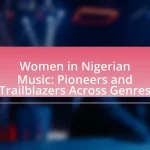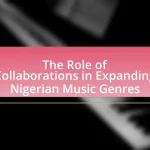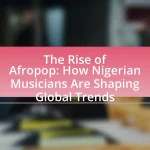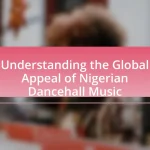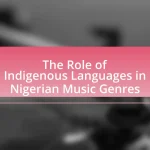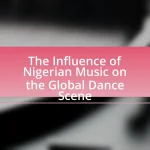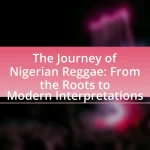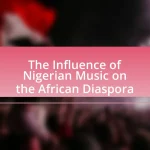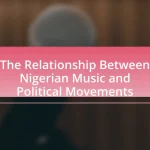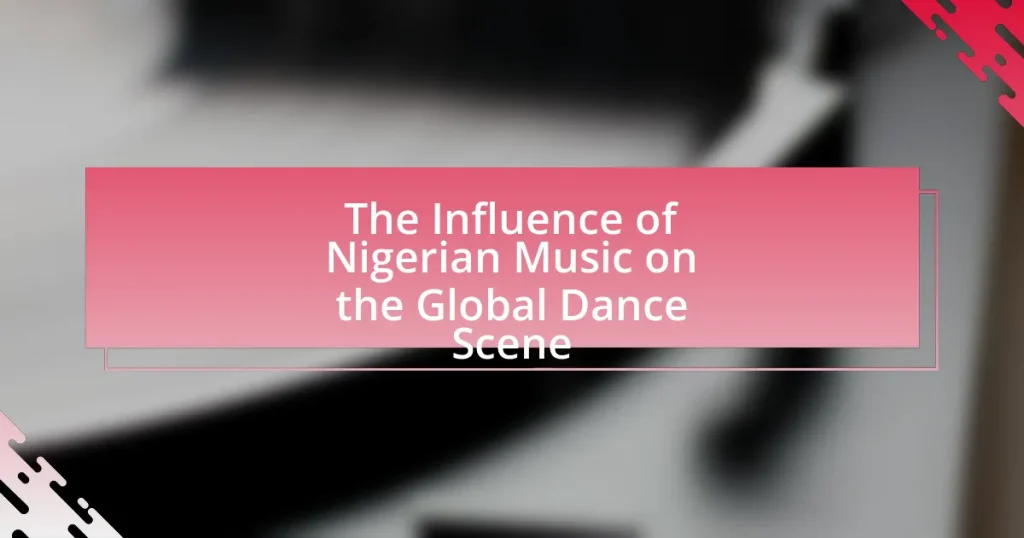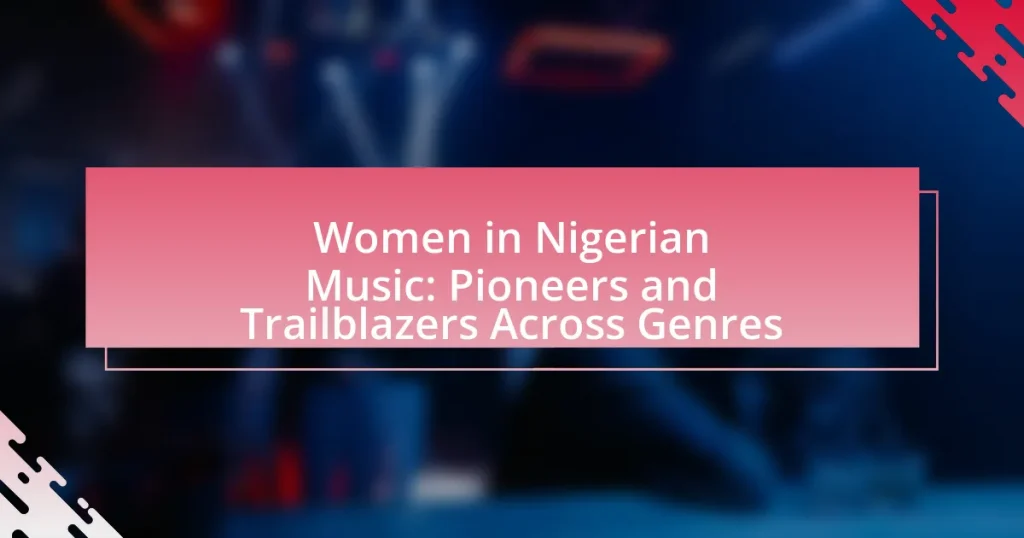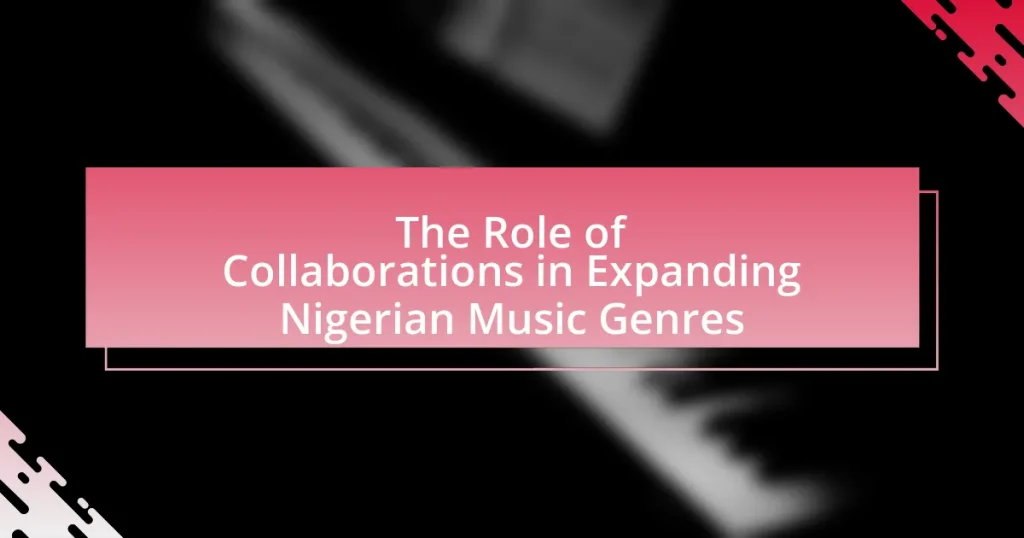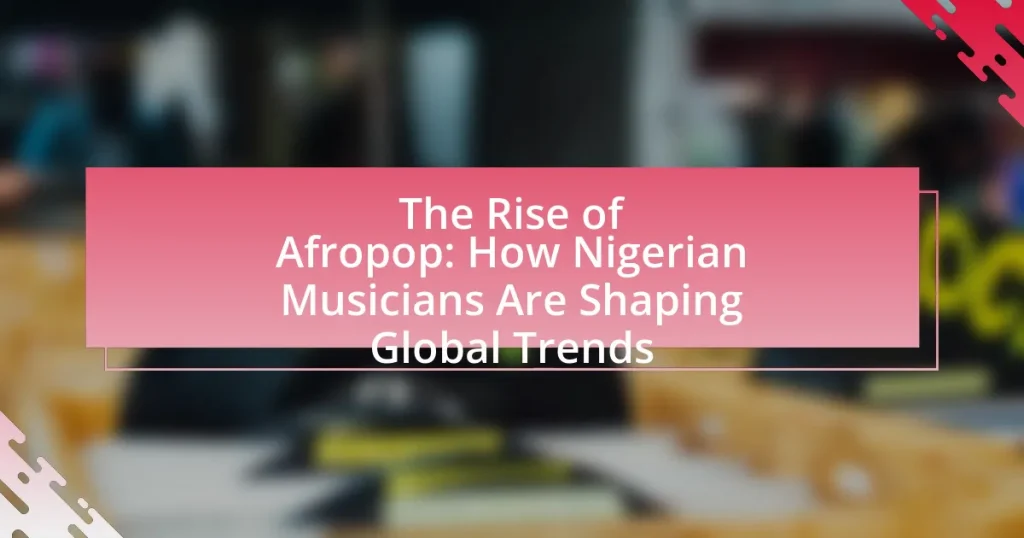The article examines the significant influence of Nigerian music, particularly genres like Afrobeats, on the global dance scene. It highlights how the rhythmic patterns and infectious beats of Nigerian music have inspired international dance trends, with artists such as Burna Boy and Wizkid leading collaborations that enhance its global appeal. Key genres, including Highlife and Juju music, are discussed for their contributions to contemporary dance forms, while the role of social media and technology in promoting Nigerian music through viral dance challenges is emphasized. The article also explores the cultural elements embedded in Nigerian music that resonate worldwide, showcasing the evolving relationship between Nigerian music and global dance styles.
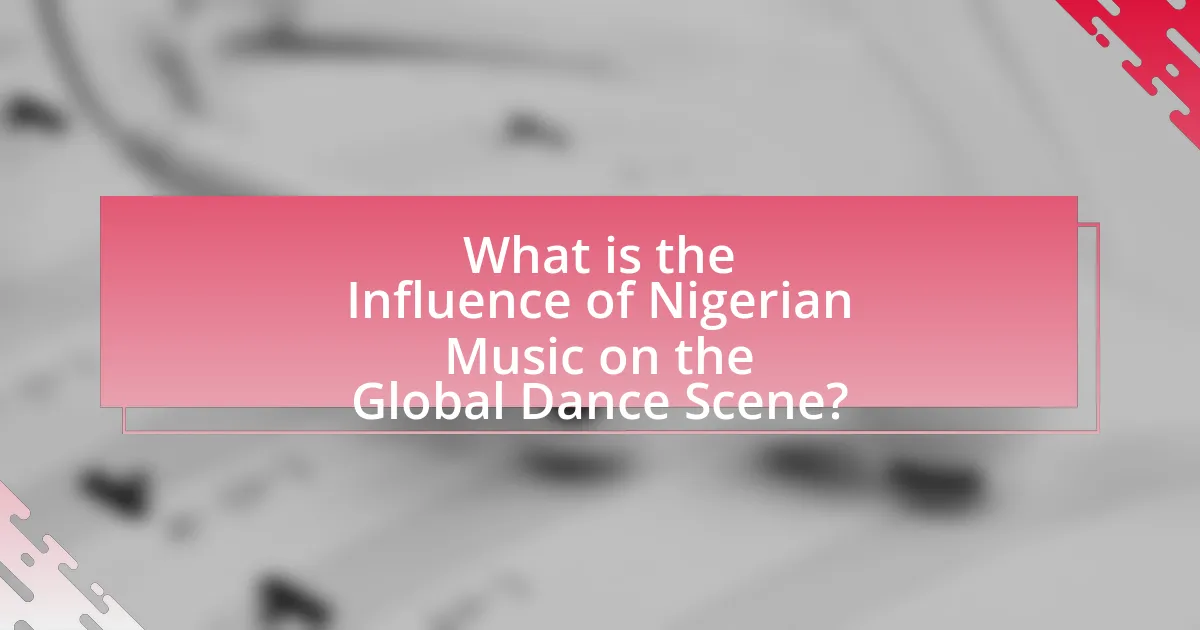
What is the Influence of Nigerian Music on the Global Dance Scene?
Nigerian music significantly influences the global dance scene, primarily through genres like Afrobeats, which have gained international popularity. The rhythmic patterns and infectious beats of Afrobeats have inspired global dance trends, leading to the incorporation of Nigerian dance styles in music videos and performances worldwide. For instance, artists such as Burna Boy and Wizkid have collaborated with international musicians, further spreading the appeal of Nigerian music and its associated dance forms. The global success of songs like “Essence” by Wizkid, which topped charts and garnered millions of streams, exemplifies this influence. Additionally, dance challenges on social media platforms, such as TikTok, often feature Nigerian music, showcasing its impact on contemporary dance culture.
How has Nigerian music evolved to impact global dance trends?
Nigerian music has evolved significantly, particularly through genres like Afrobeats, which have influenced global dance trends. The rise of artists such as Burna Boy, Wizkid, and Davido has popularized rhythmic patterns and dance styles that resonate worldwide, leading to the incorporation of these elements into international music and dance scenes. For instance, the viral success of the “Shaku Shaku” and “Zanku” dance moves, originating from Nigeria, has been embraced in global dance challenges on platforms like TikTok, showcasing the widespread appeal and adaptability of Nigerian music. This evolution is evidenced by collaborations between Nigerian artists and global stars, further solidifying the impact of Nigerian music on dance trends across various cultures.
What are the key genres of Nigerian music influencing dance?
The key genres of Nigerian music influencing dance include Afrobeats, Highlife, and Juju music. Afrobeats, characterized by its fusion of traditional African rhythms with contemporary sounds, has gained global popularity, significantly impacting dance styles worldwide. Highlife, originating from the early 20th century, blends jazz influences with African rhythms, inspiring various dance forms. Juju music, rooted in Yoruba traditions, incorporates traditional instruments and has also contributed to dance movements. These genres collectively shape the global dance scene by introducing unique rhythms and styles that resonate with audiences beyond Nigeria.
How do traditional Nigerian rhythms contribute to modern dance?
Traditional Nigerian rhythms significantly contribute to modern dance by providing foundational beats and movement patterns that influence choreography. These rhythms, such as those found in Afrobeat and traditional drumming styles, create a dynamic and energetic framework that dancers incorporate into contemporary performances. For instance, the use of polyrhythms in Nigerian music encourages complex body movements and syncopation, which are essential elements in modern dance genres like hip-hop and contemporary dance. Additionally, the cultural significance of these rhythms fosters a connection to African heritage, enriching the narrative and emotional depth of modern dance pieces. This integration of traditional elements not only enhances the aesthetic appeal but also promotes cultural exchange and appreciation within the global dance scene.
Why is Nigerian music gaining popularity in the global dance scene?
Nigerian music is gaining popularity in the global dance scene primarily due to its infectious rhythms and unique fusion of genres, particularly Afrobeats. This genre combines traditional African sounds with contemporary elements, making it appealing to a diverse audience. The rise of Nigerian artists like Burna Boy, Wizkid, and Davido, who have achieved international acclaim and collaborated with global stars, has significantly contributed to this trend. Additionally, platforms like TikTok have facilitated the viral spread of Nigerian dance challenges, further embedding these sounds into global pop culture.
What role do social media and technology play in this popularity?
Social media and technology significantly enhance the popularity of Nigerian music by facilitating global reach and engagement. Platforms like Instagram, TikTok, and YouTube allow artists to share their music widely, leading to viral trends and increased visibility. For instance, the song “Jerusalema” by Master KG gained international acclaim largely due to its viral dance challenge on TikTok, showcasing how technology can propel local music to global audiences. Additionally, streaming services such as Spotify and Apple Music provide access to Nigerian artists, allowing them to reach listeners worldwide, which further amplifies their popularity.
How do collaborations with international artists enhance Nigerian music’s reach?
Collaborations with international artists significantly enhance Nigerian music’s reach by exposing it to broader audiences and diverse markets. When Nigerian musicians partner with global stars, they tap into the established fan bases of those artists, which can lead to increased streaming numbers and sales. For instance, the collaboration between Wizkid and Drake on the track “One Dance” not only topped charts in multiple countries but also introduced Afrobeat to listeners who may not have been familiar with the genre. This cross-pollination of styles and audiences fosters greater appreciation and recognition of Nigerian music on a global scale, evidenced by the growing presence of Nigerian artists in international music festivals and award shows.
What cultural elements are embedded in Nigerian music that resonate globally?
Nigerian music incorporates cultural elements such as rhythm, storytelling, and communal participation that resonate globally. The complex polyrhythms found in genres like Afrobeats and Highlife reflect traditional African musical structures, which have influenced global music trends. Additionally, the use of indigenous languages and proverbs in lyrics conveys rich narratives and cultural heritage, appealing to diverse audiences. The communal aspect of Nigerian music, often experienced through dance and celebration, fosters a sense of unity and joy, making it relatable across cultures. These elements have contributed to the global popularity of Nigerian music, as seen in collaborations with international artists and the rise of Nigerian music festivals worldwide.
How do lyrics and themes in Nigerian music reflect cultural identity?
Lyrics and themes in Nigerian music reflect cultural identity by incorporating elements of local languages, traditions, and social issues. For instance, artists often use indigenous languages such as Yoruba, Igbo, and Hausa, which not only preserves these languages but also connects listeners to their cultural roots. Additionally, themes in songs frequently address societal challenges, such as corruption and inequality, which resonate with the lived experiences of many Nigerians. This connection is evident in the works of artists like Fela Kuti, whose Afrobeat music critiques political corruption, thereby reinforcing a sense of national identity and collective struggle. Furthermore, the celebration of cultural practices, festivals, and historical narratives in lyrics fosters a sense of pride and belonging among listeners, solidifying the role of music as a vehicle for cultural expression in Nigeria.
What visual elements in Nigerian music videos influence dance styles?
Visual elements in Nigerian music videos that influence dance styles include vibrant colors, dynamic choreography, and cultural attire. These elements create an engaging visual experience that encourages viewers to mimic the movements and styles presented. For instance, the use of traditional clothing, such as the gele and agbada, not only showcases cultural heritage but also inspires specific dance movements associated with those garments. Additionally, the incorporation of urban settings and lively backgrounds enhances the energy of the dance, making it more appealing and relatable to audiences. The choreography often reflects local dance trends, such as Azonto or Shaku Shaku, which are visually represented in the videos, further solidifying the connection between the visual presentation and the dance styles that emerge from them.
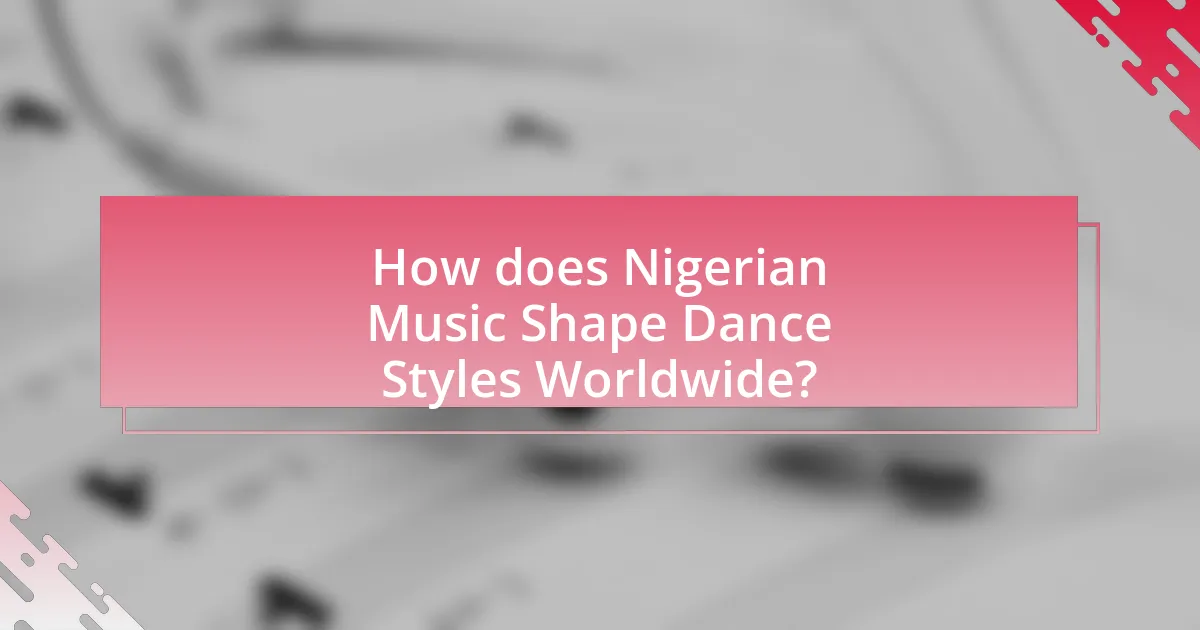
How does Nigerian Music Shape Dance Styles Worldwide?
Nigerian music significantly shapes dance styles worldwide through its diverse rhythms and cultural expressions, particularly genres like Afrobeats and traditional dances. The infectious beats and unique movements found in Nigerian music have influenced global dance trends, as seen in popular music videos and dance challenges that incorporate Nigerian-inspired choreography. For instance, the global rise of Afrobeats has led to the incorporation of its dance styles in mainstream music, with artists like Drake and Beyoncé featuring Nigerian rhythms in their work. This cross-cultural exchange highlights the impact of Nigerian music on the evolution of dance styles, making them a staple in international dance scenes.
What specific dance styles have emerged from Nigerian music?
Specific dance styles that have emerged from Nigerian music include Afrobeats, Azonto, and Shaku Shaku. Afrobeats, characterized by its fusion of various musical genres, has influenced global dance trends with its rhythmic beats and energetic movements. Azonto, originating from Ghana but popularized in Nigeria, features expressive body movements and has gained international recognition. Shaku Shaku, a street dance style that incorporates intricate footwork and body movements, has also become a significant part of Nigerian music culture, especially in the context of contemporary Nigerian pop music. These styles reflect the dynamic nature of Nigerian music and its impact on global dance trends.
How do Afrobeat and Afropop influence contemporary dance forms?
Afrobeat and Afropop significantly influence contemporary dance forms by introducing rhythmic complexity and cultural expression that resonate globally. The syncopated beats and polyrhythms characteristic of Afrobeat, pioneered by Fela Kuti, encourage improvisation and dynamic movement, which are essential in modern dance styles. Similarly, Afropop, with its catchy melodies and danceable grooves, has led to the emergence of viral dance challenges on social media platforms, further integrating African dance styles into mainstream culture. For instance, the global popularity of dances like the “Shaku Shaku” and “Zanku” showcases how these genres inspire new choreography and dance trends worldwide, reflecting a blend of traditional African movements with contemporary styles.
What are the characteristics of popular Nigerian dance moves?
Popular Nigerian dance moves are characterized by energetic rhythms, intricate footwork, and expressive body movements. These dances often reflect the cultural diversity of Nigeria, incorporating elements from various ethnic groups, such as the Yoruba, Igbo, and Hausa. For instance, the Azonto dance showcases quick, sharp movements that emphasize the upper body, while the Shaku Shaku dance features fluid legwork and a relaxed posture. Additionally, many Nigerian dance styles are performed to Afrobeat and Afropop music, which enhances their appeal and encourages participation in social settings. The global popularity of these dance moves has been amplified through social media platforms, where viral challenges and dance tutorials have contributed to their widespread recognition.
How do global dance communities incorporate Nigerian music?
Global dance communities incorporate Nigerian music by integrating its rhythms and styles into various dance forms, such as Afrobeats and traditional Nigerian dances. These communities often host workshops, dance classes, and events that focus on Nigerian music, allowing dancers to learn and perform choreographies that reflect the cultural significance of the music. For instance, the rise of Afrobeats has led to its incorporation in dance competitions and festivals worldwide, showcasing the genre’s infectious beats and danceable melodies. Additionally, collaborations between Nigerian artists and international dancers further promote the fusion of Nigerian music with global dance trends, exemplified by artists like Burna Boy and Wizkid, who have gained international acclaim and influenced dance styles globally.
What are the platforms where Nigerian music and dance intersect?
Nigerian music and dance intersect on various platforms, including social media, live performances, music festivals, and dance competitions. Social media platforms like Instagram and TikTok facilitate the viral spread of dance challenges associated with Nigerian songs, such as Afrobeats. Live performances at events like the Lagos Jazz Series and the Felabration festival showcase the synergy between music and dance in real-time. Additionally, music festivals such as the Afro Nation festival feature both Nigerian artists and dancers, highlighting their collaborative nature. Dance competitions, including the Nigerian Dance Festival, further emphasize the integration of music and dance, showcasing traditional and contemporary styles.
How do dance challenges on social media promote Nigerian music?
Dance challenges on social media promote Nigerian music by increasing its visibility and engagement among global audiences. These challenges often feature popular Nigerian songs, encouraging users to create and share dance videos, which amplifies the reach of the music. For instance, the “Jerusalema” dance challenge, which included a Nigerian remix, gained international traction, leading to millions of views and participation worldwide. This viral nature of dance challenges not only showcases Nigerian artists but also integrates their music into global pop culture, fostering a broader appreciation and consumption of Nigerian music.
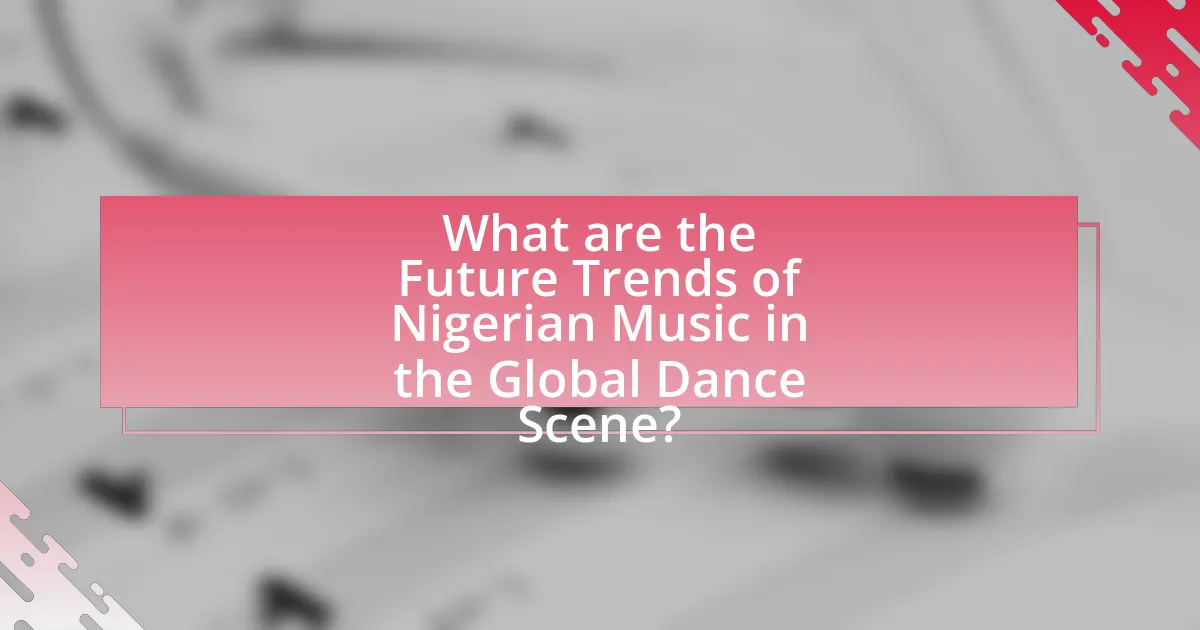
What are the Future Trends of Nigerian Music in the Global Dance Scene?
The future trends of Nigerian music in the global dance scene include the continued rise of Afrobeats, increased collaboration with international artists, and the integration of technology in music production and distribution. Afrobeats, characterized by its infectious rhythms and melodies, has gained significant traction worldwide, with artists like Burna Boy and Wizkid leading the charge. Collaborations with global stars, such as Drake and Beyoncé, further amplify Nigerian music’s reach and influence. Additionally, advancements in technology, including streaming platforms and social media, facilitate the rapid dissemination of Nigerian music, allowing it to penetrate diverse markets and cultures. This trend is supported by the growing number of Nigerian artists charting on international platforms, indicating a robust global presence.
How is the fusion of genres shaping the future of dance?
The fusion of genres is shaping the future of dance by creating innovative styles that blend traditional and contemporary movements, enhancing global appeal. This trend is evident in the rise of Afrobeat, which combines elements of traditional Nigerian music with jazz, funk, and hip-hop, leading to new dance forms that resonate with diverse audiences. For instance, the popularity of dances like the Shaku Shaku and Gwara Gwara, rooted in Nigerian culture, has gained international traction, influencing dance trends worldwide. This genre fusion not only promotes cultural exchange but also encourages collaboration among artists across different backgrounds, further enriching the dance landscape.
What emerging artists are leading the charge in this fusion?
Emerging artists leading the charge in the fusion of Nigerian music and global dance include Burna Boy, Tems, and Rema. Burna Boy has gained international acclaim with his Afro-fusion style, blending Afrobeat with various genres, evidenced by his Grammy Award for Best World Music Album in 2020. Tems has made significant strides with her unique sound that combines R&B and Afrobeat, highlighted by her collaboration on Wizkid’s “Essence,” which topped charts globally. Rema, known for his hit “Dumebi,” has also contributed to this fusion by incorporating trap and pop elements into his music, appealing to a diverse audience. These artists exemplify the growing influence of Nigerian music on the global dance scene.
How might technological advancements further influence this trend?
Technological advancements will likely enhance the global reach and accessibility of Nigerian music, further influencing its impact on the global dance scene. Innovations such as streaming platforms, social media, and digital production tools enable artists to distribute their music widely and engage with international audiences. For instance, platforms like Spotify and Apple Music have reported significant increases in the consumption of Afrobeats, a genre rooted in Nigerian music, with a 50% rise in global streams from 2019 to 2021. Additionally, social media trends, particularly on TikTok, have propelled Nigerian dance challenges to viral status, showcasing the music’s influence on global dance culture. These advancements facilitate collaboration between Nigerian artists and international musicians, fostering a fusion of styles that further enriches the global dance landscape.
What practical steps can dancers take to incorporate Nigerian music into their routines?
Dancers can incorporate Nigerian music into their routines by selecting specific genres such as Afrobeats, Highlife, or traditional Nigerian rhythms that resonate with their style. They should study the unique dance movements associated with these genres, such as the Shaku Shaku or Zanku, which are integral to the music’s cultural expression. Additionally, dancers can collaborate with Nigerian musicians or attend workshops that focus on Nigerian dance styles to gain authentic insights. Research indicates that the global popularity of Afrobeats has led to increased interest in its accompanying dance forms, making it relevant for contemporary routines.
How can dancers learn popular Nigerian dance moves effectively?
Dancers can learn popular Nigerian dance moves effectively by engaging in structured practice through online tutorials, dance classes, and social media platforms that showcase these styles. Online platforms like YouTube feature numerous tutorials that break down popular moves such as the Shaku Shaku and Zanku, allowing dancers to learn at their own pace. Additionally, participating in dance workshops led by experienced instructors provides hands-on guidance and immediate feedback, which enhances learning. Social media platforms like Instagram and TikTok also serve as valuable resources, where dancers can observe and replicate trending moves, fostering a community of practice. This multi-faceted approach combines visual learning, peer interaction, and expert instruction, making it an effective strategy for mastering Nigerian dance styles.
What resources are available for exploring Nigerian music and dance styles?
Resources for exploring Nigerian music and dance styles include academic journals, online platforms, and cultural institutions. Academic journals such as “African Music” provide scholarly articles on various aspects of Nigerian music, while platforms like YouTube and Spotify offer access to a wide range of Nigerian music genres, including Afrobeats and traditional styles. Cultural institutions, such as the National Museum in Lagos and the Nigerian Cultural Centre, host exhibitions and performances that showcase traditional dance forms like the Bata and Atilogwu. These resources collectively enhance understanding and appreciation of Nigeria’s rich musical and dance heritage.
